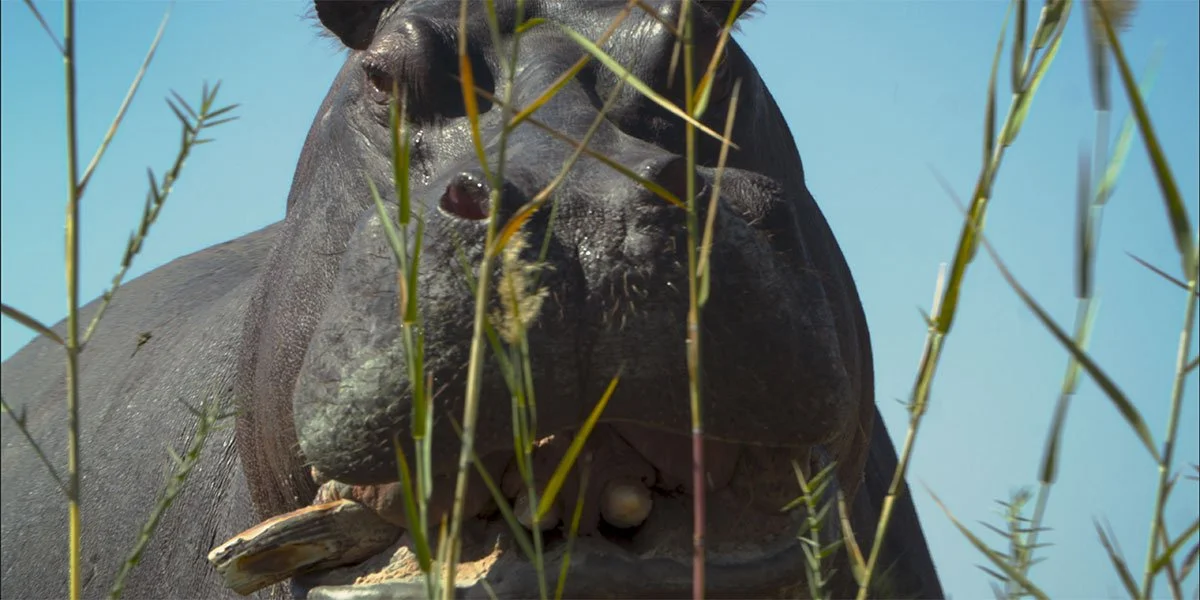‘Pepe’ Review: Flashes of Brilliance Intermingle with Frustration in This Eccentric “Cocaine Hippo” Biopic
TIFF
Decades before Moo Deng became one of the internet’s most well-known meme celebrities, another renowned hippopotamus garnered much-frenzied public fascination: Pepe. The progeny of Colombian drug lord Pablo Escobar’s infamous “cocaine hippos,” Pepe was heroized following the widespread outcry in response to his death at the hands of the Colombian military back in 2009.
Dominican filmmaker Nelson Carlo De Los Santos Arias reincarnates the spirit of Escobar’s most eminent menagerie constituent in the eponymously titled Pepe, undoubtedly one of the most unorthodox and eccentric movies about a safari creature that audiences will ever witness. Traversing different languages, continents, and even filmic mediums, Pepe operates as an experimental rumination on colonialism, displacement, and collective trauma, all channeled through Pepe’s attainment of sentience at the precise moment of his violent death. Filled to the brim with fascinating artistic impulses and intellectual statements from the first frame to the last, Pepe works as a bewitching spectacle of cinema that will exhilarate some viewers and definitely exasperate others.
TIFF
Pepe uses a reverberating baritone voiceover to give the gift of speech to its non-human protagonist, begetting a primordial and humorous effect, with the hippo emitting a rumbling chuckle at the end of nearly every sentence. Pepe narrates as he takes us back in time to Southwest Africa, where his family was torn from their ancestral residence in the Okavango River and shipped across the Atlantic to Escobar’s countryside playground, Hacienda Nápoles, during the late 1970s. For a time, Pepe’s kin thrived in the conditions of their foreign surroundings, eventually birthing our protagonist and escaping from the kingpin’s property into the surrounding Colombian lushness, devoid of any predators in nature’s hierarchy.
Pushed into exile by his assertive older brothers by the time he reaches maturity, Pepe ventures into Colombia’s Magdalena River with a single female companion, slowly encroaching on the human populations sustained on the body of water, unable to understand the impacts of his alien presence in the region. When a small rural village becomes fixated on Pepe’s existence, they contact the province’s higher-ups, who in turn employ a Colombian military troop to exterminate the enormous creature, so very far from his original homeland.
TIFF
Filmed in different parts of Africa and Colombia, Pepe inventively merges many, many mediums to create its striking visual language that never stops transforming throughout its two-hour runtime. Animation, archival and nature cam footage, 16mm film, and digital all work together to construct the movie’s kaleidoscopic imagery, wholly unparalleled by any other work in recent memory. De Los Santos Arias beautifully captures both the tranquility and brute strength that hippos possess as one of the most aggressive and territorial animals roaming our world, capturing gorgeous moments on celluloid that could rival any of the most renowned nature documentaries. Working as a connective thread through these disparate aesthetic choices, the movie returns time and time again to aerial shots as though Pepe himself is viewing the world from above, from the afterlife, exactly from where he is contemplating.
Caught somewhere between the instinctive yearnings for his African homeland and his unchosen destiny in Colombia, Pepe’s displacement speaks equally to the experiences of populations in both places, communities forever altered by the damaging results of colonialism. As the influences of capital force their way through the two distant locations over time, the exploitative implications embed themselves within their cultural fabric and national identity. Speaking on behalf of his post-mortem rise to notoriety, Pepe paraphrases the perceived sentiments of his assassins: “He was an infiltrator who did not deserve to be nationalized.” Pepe tackles these intricate geopolitical viewpoints with a murkiness that is largely unsatisfying but possibly in a way that mirrors the complexity of such realities in a post-colonial world.
As the movie steps away from Pepe’s point-of-view in its final act and places more emphasis on the riverside community that has grown weary of his pachyderm presence, De Los Santos Arias’ political assertions become much more coherent. The fear and uncertainty of Pepe’s human characters are comprehensible, particularly when considering Colombia’s collective trauma, thanks to the unrest that lasted much of the 20th century’s latter half. These are people shaped by recollections of violence and distrust due to severe political and infrastructural instability, along with criminal corruption that impacted hundreds of thousands of lives. These memories contribute to the village’s hysteria in the face of flux, their preoccupation with stamping out an outsider who could threaten their stasis.
It is a safe bet to express that De Los Santos Arias’ latest work is an oddity in the landscape of contemporary cinema, stuffed to the gills with creative tendencies and ideas that do not always gel in the most gratifying ways. Nevertheless, Pepe is undoubtedly a film that will stay in your memory not only because of its ghostly hippopotamus hero but also its refusal to play by the rules of convention, culminating with a film of brilliant singularity that pushes full throttle to support its bold proclamations.
3.5/5
2024 | 123 minutes | Black & White, Color | Spanish, Afrikaans, German, Mbukushu
'Pepe' world premiered at the 2024 Berlin Film Festival, where De Los Santos Arias was awarded the Silver Bear for Best Director. 'Pepe' is now streaming in most territories on MUBI.


